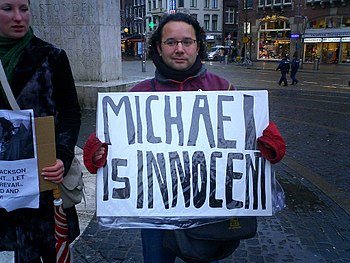| Fans protest Michael Jackson's innocence in the child molestation scandal in 2004 (Photo credit: Wikipedia) |
Your file would also contain plenty of other cases where it seems obvious that the bad acts in question would not have occurred without religion (e.g., genital mutilation, honor killings, exorcism, the murder of "witches" and others believed to have magic powers, ex-gay therapy, cartoon-related murders, faith healing). In these and many other examples, religion is not just a factor but often the primary motive. These are things that would not be happening but for religion.
When a defensive Christian points out that some atheists have molested children too, he or she is correct. Some have noted a disturbing example of a few atheists at one popular blog network rallying around a confessed child rapist (i.e., Ogvorbis) in much the same way many conservative Christians are now rallying around Josh Duggar. In both cases, we are probably looking at examples of how tribalism can lead people to excuse abhorrent behavior when it is committed by one of their own. Clearly, this does not require religion. One might even argue, although I'm not sure I'd agree, that the reason these two cases look different is primarily due to the massive difference in the size and popularity of the tribes involved.
It seems to me that there are two valid and rather different sorts of responses we might make to the religious believer who is trying to argue that religion is not relevant because atheists do bad things too. The first sort of response starts by accepting the reality that atheists and other secular persons can and do commit bad acts. It then goes on to explain how we do not have the sort of dogma, institutions, indoctrination, privilege that facilitate them (or their concealment) or that leads people to justify and excuse them. It is very difficult to think of scenarios where we could reasonably say that a crime is easier to tolerate because of atheism.
The second sort of response focuses on the sort of bad acts that do not appear to happen but for religion. As noted above, there are many of these from which one can choose. Can the religious believer think of any bad acts that would not be happening but for atheism? I don't think I'd go quite so far as to say that this could never happen under any circumstances, but it seems unlikely that is is happening now given our lack of dogma, power, privilege, power structures, and the like.
If we were to select the example of cartoon-inspired violence by Muslims who are outraged that someone dared to depict their "prophet," it should be fairly easy to make the case that this sort of violence does not happen but for religion. We do not need to claim that all Muslims are violent or that all Muslims are offended by drawings of Muhammad. All we have to do is point out how all the Muslims who support this particular sort of violence do so for religious reasons. In contrast, I cannot think of any examples where we could say that everyone engaging in certain types of violence justifies it via atheism. We atheists seem to be missing something fairly crucial here: dogma.
We cannot pretend to have divine justification for anything we do. We have no magic book we can use to justify any bad act we might like to perform. We have no supernatural beings to imbue our bad acts with false righteousness or to absolve our guilty feelings. We have no rewards to look forward to in an afterlife. We are stuck with having to live with the consequences of what we do in the here and now. If we are going to be judged, it will be by our peers and it will happen in this life.
Because I'd like to end on an upbeat note, I'll suggest that it has become increasingly difficult for religious persons and their institutions to conceal bad acts from the rest of us. It isn't just that we atheists know about these bad acts; it is that the religious believers know that everyone knows. And this just might make the entire enterprise a bit more difficult to sustain.
